Comparative Religions Assignment: Confucius and Lao Tzu's Ideas
VerifiedAdded on 2020/04/29
|5
|980
|465
Homework Assignment
AI Summary
This assignment offers a comparative analysis of the core ideas presented in Confucius' Analects and Lao Tzu's Tao Te Ching. The assignment begins by exploring four key ideas from Confucius: goodness/humanness, the concept of the gentleman or superior scholar, the importance of rites and rituals, and the significance of learning. Each concept is explained with examples. Following this, the assignment delves into four ideas from Lao Tzu's Tao Te Ching: reverence for all life, natural sincerity, gentleness, and supportiveness. The assignment explains each concept and provides examples to illustrate their meaning. The document includes a list of references. This assignment is designed to provide a comprehensive understanding of the philosophies of Confucius and Lao Tzu and their relevance to humanistic values.
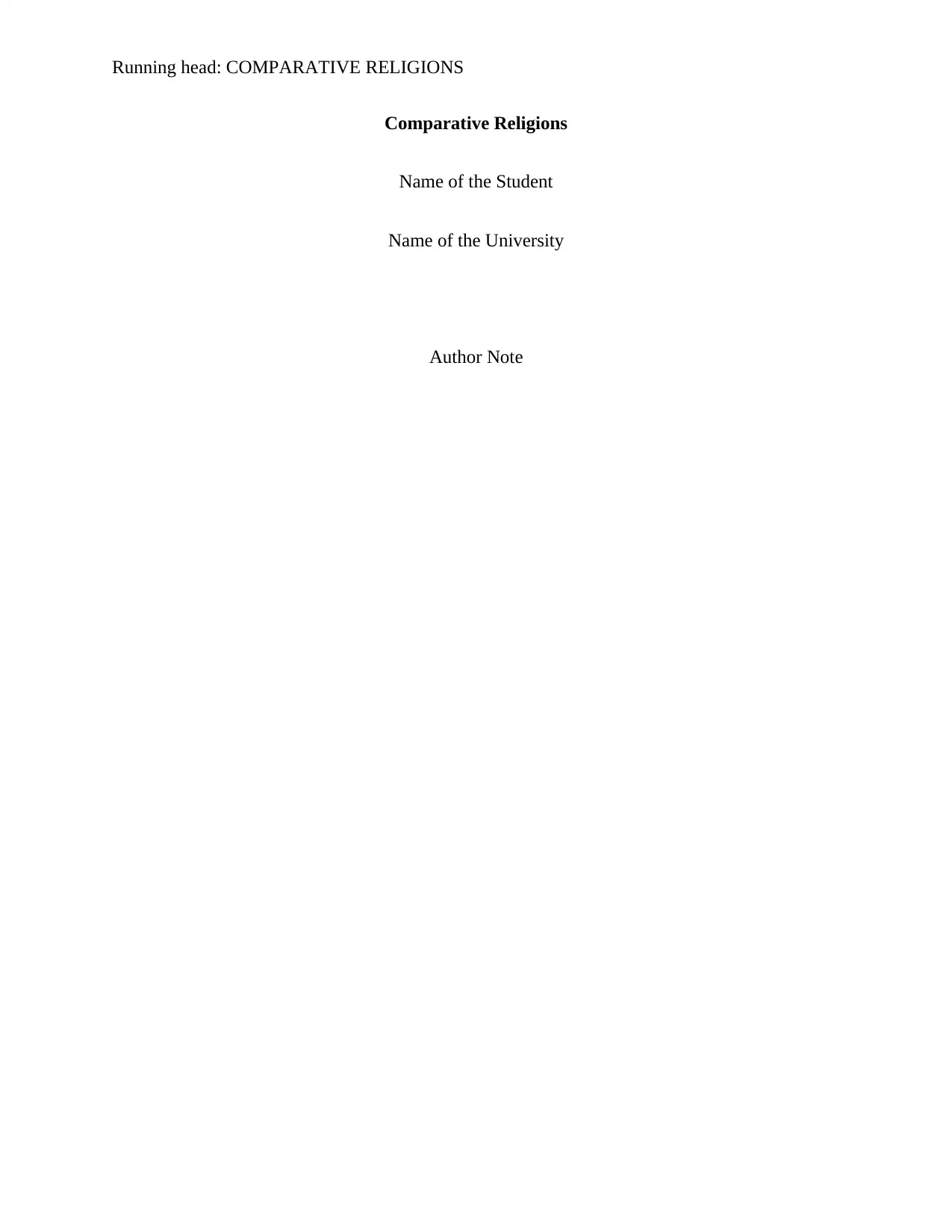
Running head: COMPARATIVE RELIGIONS
Comparative Religions
Name of the Student
Name of the University
Author Note
Comparative Religions
Name of the Student
Name of the University
Author Note
Paraphrase This Document
Need a fresh take? Get an instant paraphrase of this document with our AI Paraphraser
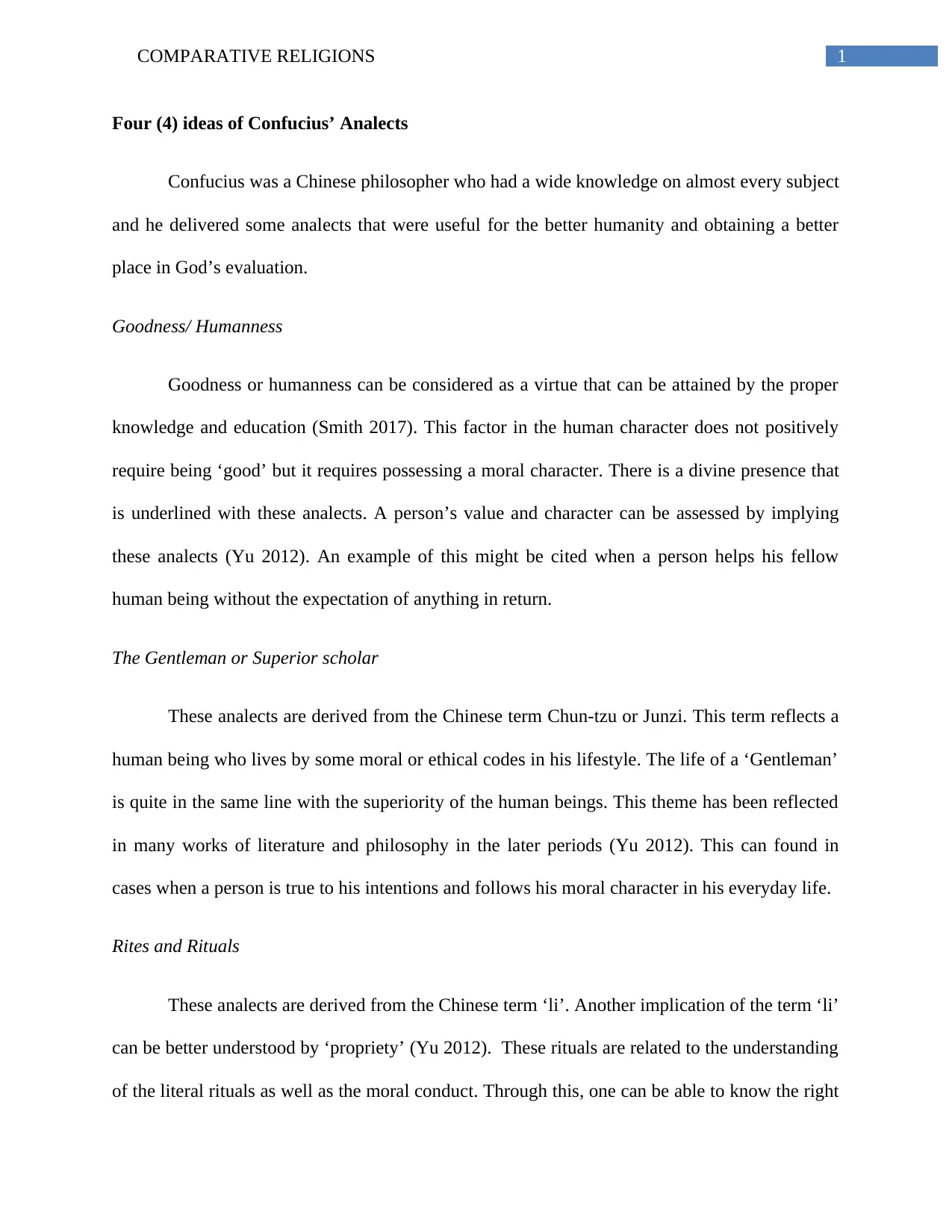
1COMPARATIVE RELIGIONS
Four (4) ideas of Confucius’ Analects
Confucius was a Chinese philosopher who had a wide knowledge on almost every subject
and he delivered some analects that were useful for the better humanity and obtaining a better
place in God’s evaluation.
Goodness/ Humanness
Goodness or humanness can be considered as a virtue that can be attained by the proper
knowledge and education (Smith 2017). This factor in the human character does not positively
require being ‘good’ but it requires possessing a moral character. There is a divine presence that
is underlined with these analects. A person’s value and character can be assessed by implying
these analects (Yu 2012). An example of this might be cited when a person helps his fellow
human being without the expectation of anything in return.
The Gentleman or Superior scholar
These analects are derived from the Chinese term Chun-tzu or Junzi. This term reflects a
human being who lives by some moral or ethical codes in his lifestyle. The life of a ‘Gentleman’
is quite in the same line with the superiority of the human beings. This theme has been reflected
in many works of literature and philosophy in the later periods (Yu 2012). This can found in
cases when a person is true to his intentions and follows his moral character in his everyday life.
Rites and Rituals
These analects are derived from the Chinese term ‘li’. Another implication of the term ‘li’
can be better understood by ‘propriety’ (Yu 2012). These rituals are related to the understanding
of the literal rituals as well as the moral conduct. Through this, one can be able to know the right
Four (4) ideas of Confucius’ Analects
Confucius was a Chinese philosopher who had a wide knowledge on almost every subject
and he delivered some analects that were useful for the better humanity and obtaining a better
place in God’s evaluation.
Goodness/ Humanness
Goodness or humanness can be considered as a virtue that can be attained by the proper
knowledge and education (Smith 2017). This factor in the human character does not positively
require being ‘good’ but it requires possessing a moral character. There is a divine presence that
is underlined with these analects. A person’s value and character can be assessed by implying
these analects (Yu 2012). An example of this might be cited when a person helps his fellow
human being without the expectation of anything in return.
The Gentleman or Superior scholar
These analects are derived from the Chinese term Chun-tzu or Junzi. This term reflects a
human being who lives by some moral or ethical codes in his lifestyle. The life of a ‘Gentleman’
is quite in the same line with the superiority of the human beings. This theme has been reflected
in many works of literature and philosophy in the later periods (Yu 2012). This can found in
cases when a person is true to his intentions and follows his moral character in his everyday life.
Rites and Rituals
These analects are derived from the Chinese term ‘li’. Another implication of the term ‘li’
can be better understood by ‘propriety’ (Yu 2012). These rituals are related to the understanding
of the literal rituals as well as the moral conduct. Through this, one can be able to know the right
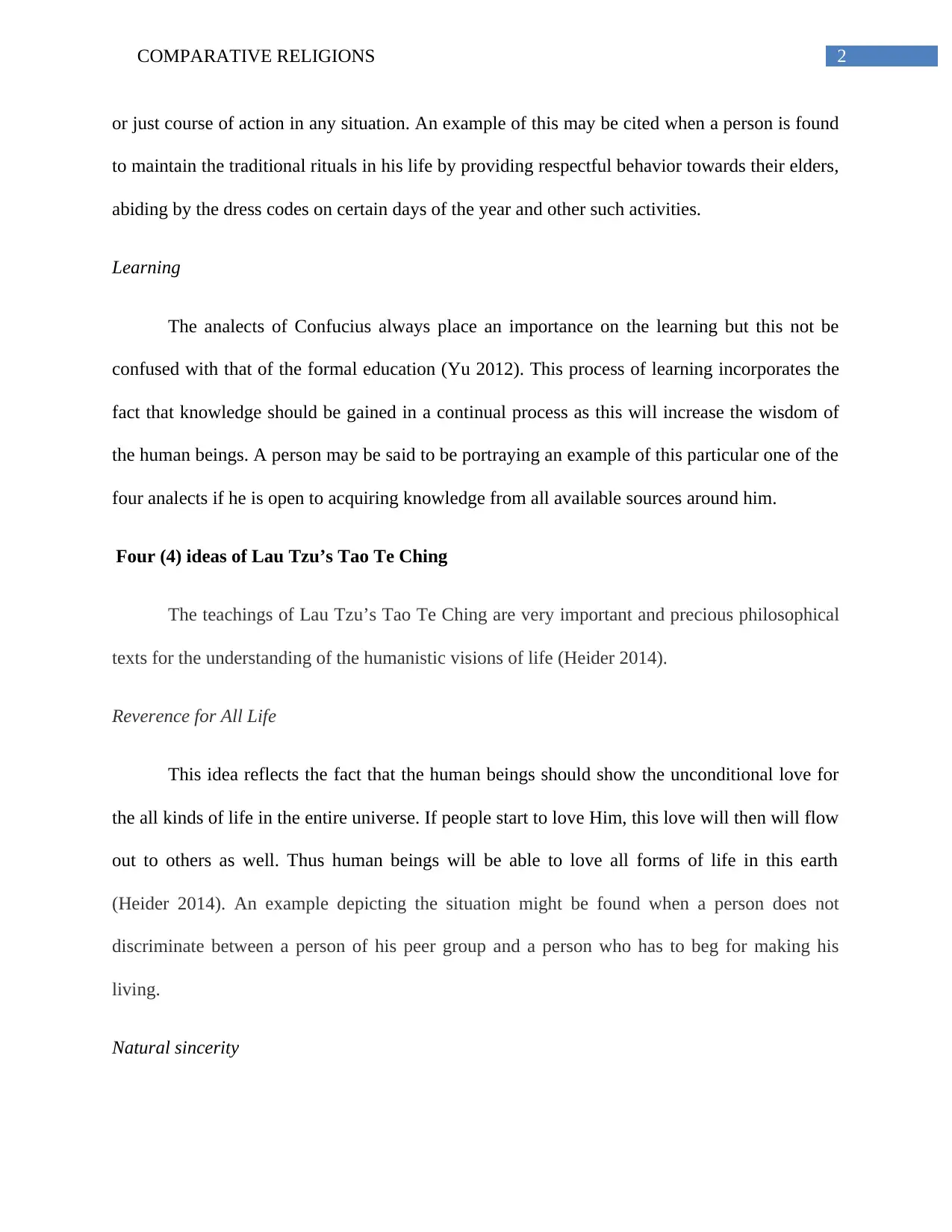
2COMPARATIVE RELIGIONS
or just course of action in any situation. An example of this may be cited when a person is found
to maintain the traditional rituals in his life by providing respectful behavior towards their elders,
abiding by the dress codes on certain days of the year and other such activities.
Learning
The analects of Confucius always place an importance on the learning but this not be
confused with that of the formal education (Yu 2012). This process of learning incorporates the
fact that knowledge should be gained in a continual process as this will increase the wisdom of
the human beings. A person may be said to be portraying an example of this particular one of the
four analects if he is open to acquiring knowledge from all available sources around him.
Four (4) ideas of Lau Tzu’s Tao Te Ching
The teachings of Lau Tzu’s Tao Te Ching are very important and precious philosophical
texts for the understanding of the humanistic visions of life (Heider 2014).
Reverence for All Life
This idea reflects the fact that the human beings should show the unconditional love for
the all kinds of life in the entire universe. If people start to love Him, this love will then will flow
out to others as well. Thus human beings will be able to love all forms of life in this earth
(Heider 2014). An example depicting the situation might be found when a person does not
discriminate between a person of his peer group and a person who has to beg for making his
living.
Natural sincerity
or just course of action in any situation. An example of this may be cited when a person is found
to maintain the traditional rituals in his life by providing respectful behavior towards their elders,
abiding by the dress codes on certain days of the year and other such activities.
Learning
The analects of Confucius always place an importance on the learning but this not be
confused with that of the formal education (Yu 2012). This process of learning incorporates the
fact that knowledge should be gained in a continual process as this will increase the wisdom of
the human beings. A person may be said to be portraying an example of this particular one of the
four analects if he is open to acquiring knowledge from all available sources around him.
Four (4) ideas of Lau Tzu’s Tao Te Ching
The teachings of Lau Tzu’s Tao Te Ching are very important and precious philosophical
texts for the understanding of the humanistic visions of life (Heider 2014).
Reverence for All Life
This idea reflects the fact that the human beings should show the unconditional love for
the all kinds of life in the entire universe. If people start to love Him, this love will then will flow
out to others as well. Thus human beings will be able to love all forms of life in this earth
(Heider 2014). An example depicting the situation might be found when a person does not
discriminate between a person of his peer group and a person who has to beg for making his
living.
Natural sincerity
⊘ This is a preview!⊘
Do you want full access?
Subscribe today to unlock all pages.

Trusted by 1+ million students worldwide
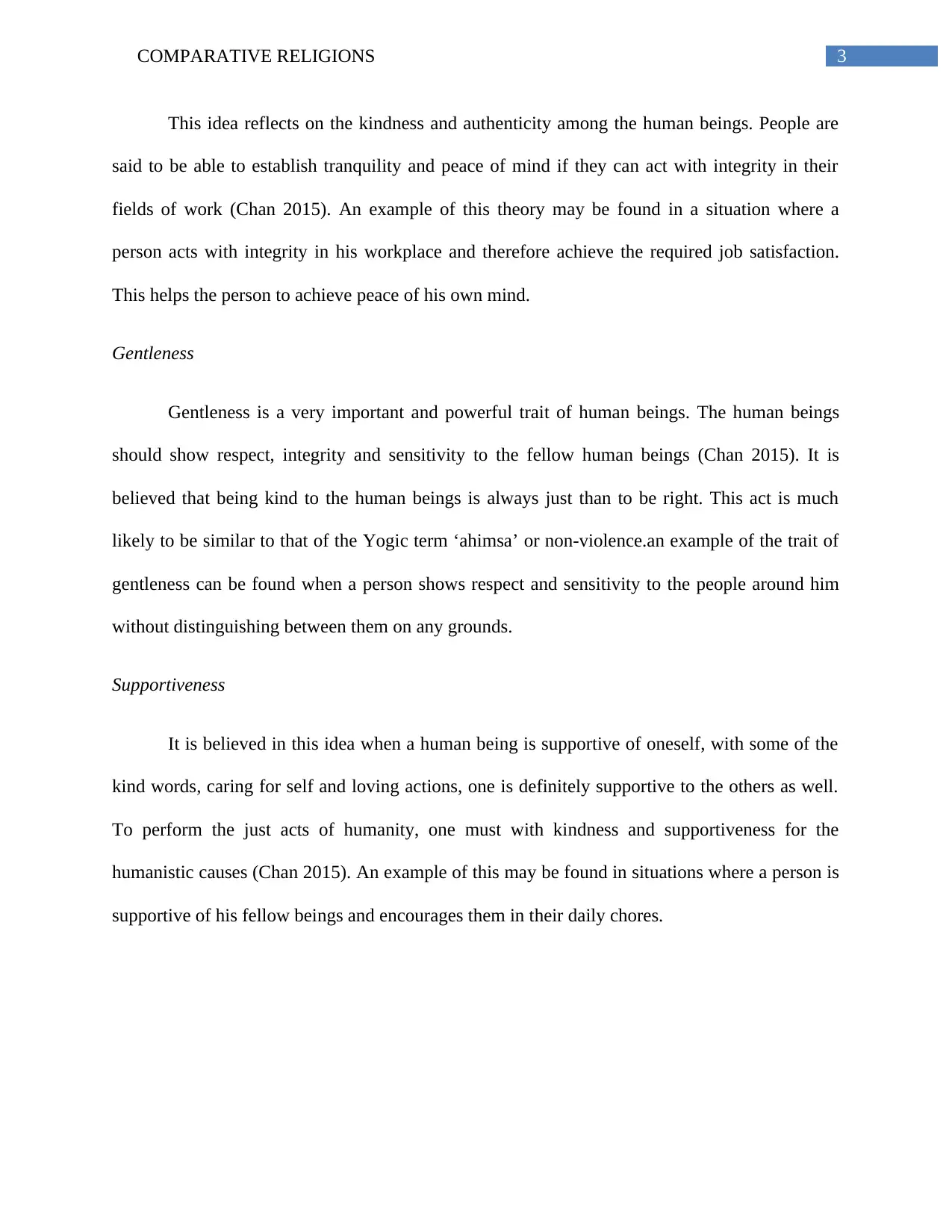
3COMPARATIVE RELIGIONS
This idea reflects on the kindness and authenticity among the human beings. People are
said to be able to establish tranquility and peace of mind if they can act with integrity in their
fields of work (Chan 2015). An example of this theory may be found in a situation where a
person acts with integrity in his workplace and therefore achieve the required job satisfaction.
This helps the person to achieve peace of his own mind.
Gentleness
Gentleness is a very important and powerful trait of human beings. The human beings
should show respect, integrity and sensitivity to the fellow human beings (Chan 2015). It is
believed that being kind to the human beings is always just than to be right. This act is much
likely to be similar to that of the Yogic term ‘ahimsa’ or non-violence.an example of the trait of
gentleness can be found when a person shows respect and sensitivity to the people around him
without distinguishing between them on any grounds.
Supportiveness
It is believed in this idea when a human being is supportive of oneself, with some of the
kind words, caring for self and loving actions, one is definitely supportive to the others as well.
To perform the just acts of humanity, one must with kindness and supportiveness for the
humanistic causes (Chan 2015). An example of this may be found in situations where a person is
supportive of his fellow beings and encourages them in their daily chores.
This idea reflects on the kindness and authenticity among the human beings. People are
said to be able to establish tranquility and peace of mind if they can act with integrity in their
fields of work (Chan 2015). An example of this theory may be found in a situation where a
person acts with integrity in his workplace and therefore achieve the required job satisfaction.
This helps the person to achieve peace of his own mind.
Gentleness
Gentleness is a very important and powerful trait of human beings. The human beings
should show respect, integrity and sensitivity to the fellow human beings (Chan 2015). It is
believed that being kind to the human beings is always just than to be right. This act is much
likely to be similar to that of the Yogic term ‘ahimsa’ or non-violence.an example of the trait of
gentleness can be found when a person shows respect and sensitivity to the people around him
without distinguishing between them on any grounds.
Supportiveness
It is believed in this idea when a human being is supportive of oneself, with some of the
kind words, caring for self and loving actions, one is definitely supportive to the others as well.
To perform the just acts of humanity, one must with kindness and supportiveness for the
humanistic causes (Chan 2015). An example of this may be found in situations where a person is
supportive of his fellow beings and encourages them in their daily chores.
Paraphrase This Document
Need a fresh take? Get an instant paraphrase of this document with our AI Paraphraser
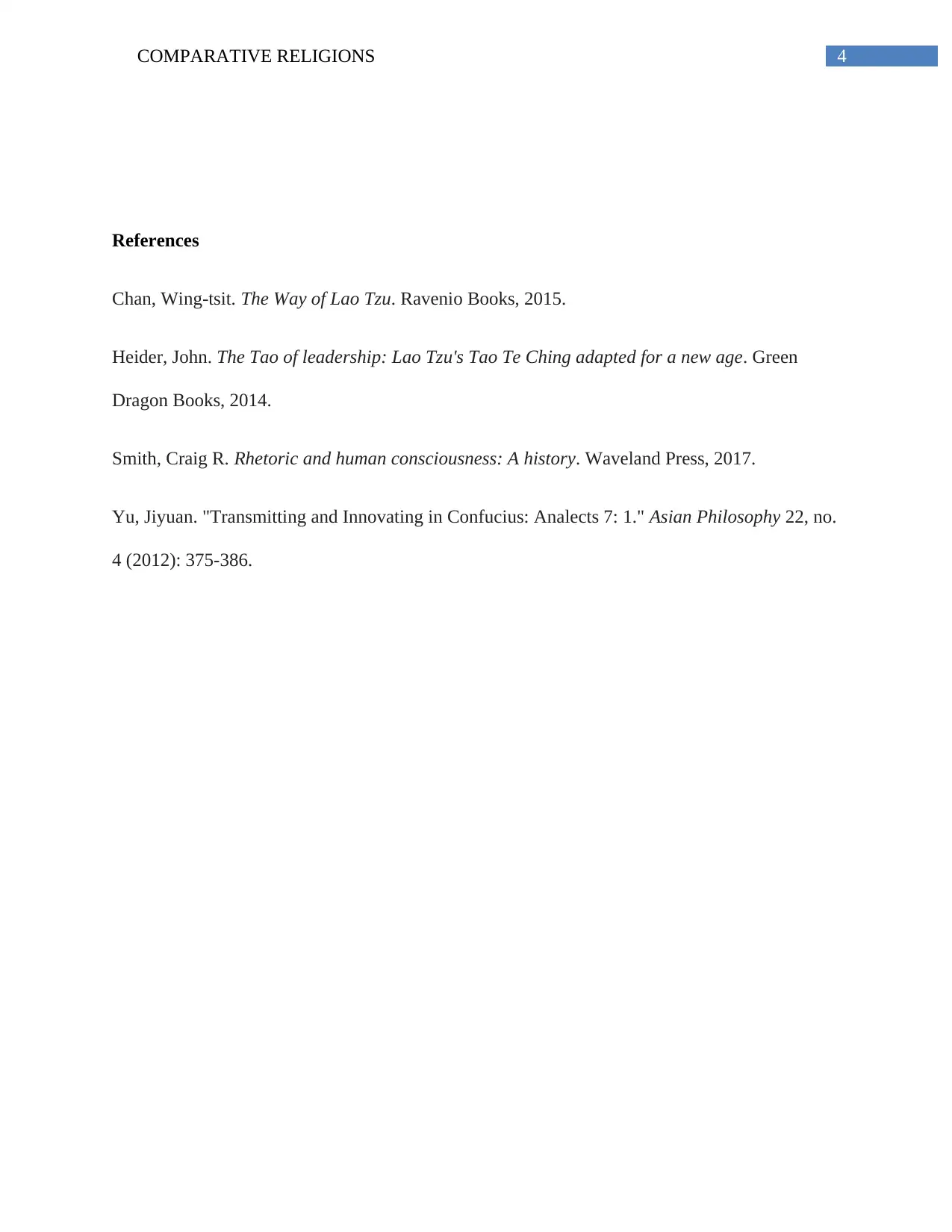
4COMPARATIVE RELIGIONS
References
Chan, Wing-tsit. The Way of Lao Tzu. Ravenio Books, 2015.
Heider, John. The Tao of leadership: Lao Tzu's Tao Te Ching adapted for a new age. Green
Dragon Books, 2014.
Smith, Craig R. Rhetoric and human consciousness: A history. Waveland Press, 2017.
Yu, Jiyuan. "Transmitting and Innovating in Confucius: Analects 7: 1." Asian Philosophy 22, no.
4 (2012): 375-386.
References
Chan, Wing-tsit. The Way of Lao Tzu. Ravenio Books, 2015.
Heider, John. The Tao of leadership: Lao Tzu's Tao Te Ching adapted for a new age. Green
Dragon Books, 2014.
Smith, Craig R. Rhetoric and human consciousness: A history. Waveland Press, 2017.
Yu, Jiyuan. "Transmitting and Innovating in Confucius: Analects 7: 1." Asian Philosophy 22, no.
4 (2012): 375-386.
1 out of 5
Your All-in-One AI-Powered Toolkit for Academic Success.
+13062052269
info@desklib.com
Available 24*7 on WhatsApp / Email
![[object Object]](/_next/static/media/star-bottom.7253800d.svg)
Unlock your academic potential
Copyright © 2020–2026 A2Z Services. All Rights Reserved. Developed and managed by ZUCOL.


